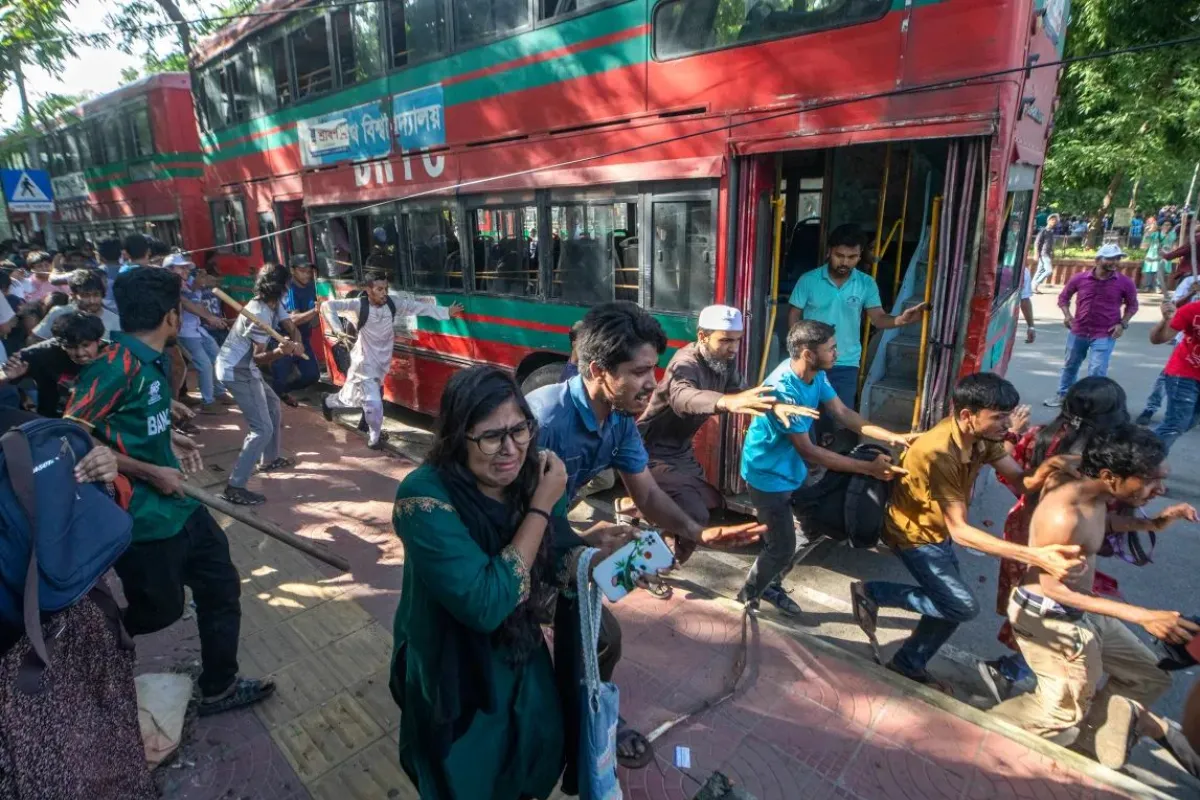In major Bangladeshi cities, protesters calling for changes to the quota system for government employment resulted in at least six fatalities, including three students, and over 100 injuries on Tuesday. Colleges and schools were forced to close as a result of the violence.
Protests Turn Deadly in Dhaka and Chattogram
The police reported two new fatalities in Dhaka and Chattogram, adding to the four deaths already reported from these cities and Rangpur earlier in the day. Among the deceased, at least three were students. The violence injured around 400 people as the protests spread across major cities, escalating a week-long series of demonstrations.
Government Deploys Troops and Shuts Down Schools
In response to the escalating violence, authorities deployed paramilitary Border Guard Bangladesh (BGB) troops in four major cities and ordered the closure of all educational institutions until further notice. “All high schools, colleges, madrasahs, and polytechnic institutes will be shut down for the safety of the students,” an education ministry spokesman said.
Capital Empties Amid Violence
The usually bustling capital, Dhaka, saw its streets almost empty as unidentified individuals set fire to two buses and detonated Molotov cocktails. Sporadic clashes caused roadblocks, stranding thousands of people.
Clashes Erupt Between Students and Ruling Party Activists
When members from the student branch of the ruling Awami League attacked protestors on Monday, the disturbance became more intense. The demonstrators claimed that the Bangladesh Chhatra League, the student branch, was using police backing to attack their nonviolent protests. In Dhaka, Rajshahi, Khulna, and Chattogram, protesters blocked roads and railway tracks, and police used tear gas and rubber bullets on college students.
Students Demand Merit-Based Job Quotas
Students from Dhaka University led the week-long protests, demanding that government job quotas be filled based on talent. Currently, 30% of jobs are reserved for descendants of 1971 Liberation War veterans, 10% for administrative districts, 10% for women, 5% for ethnic minorities, and 1% for physically handicapped individuals. Annually, about 3,000 government jobs are available for nearly 400,000 graduates.
Government Defends Quota System
Prime Minister Sheikh Hasina defended the quota system, emphasizing the sacrifices of war veterans. “War veterans deserve the highest respect for their sacrifices in 1971,” she said. Hasina criticized the protesters, arguing that the benefits should go to those who fought for Bangladesh’s independence, not those who sided with Pakistani troops.
Legal Battles Over Quota Reforms
In 2018, mass student protests led to the suspension of the quotas. However, a high court order last month reinstated the quotas for veterans’ families, sparking renewed protests. The Supreme Court temporarily halted the high court’s order and urged students to return to classes, promising a decision in four weeks. Despite this, the protests continued, disrupting traffic in Dhaka.
International Reactions
Amnesty International and the US State Department condemned the violence against peaceful protesters, urging Bangladesh authorities to ensure their safety. This prompted a sharp response from Bangladesh’s foreign ministry.
Keep watching our YouTube Channel ‘DNP INDIA’. Also, please subscribe and follow us on FACEBOOK, INSTAGRAM, and TWITTER.
